General
Prof. Sachs Expresses Optimism about Africa’s Economic Growth, PDMs Success
Published
1 year agoon
By
Mak Editor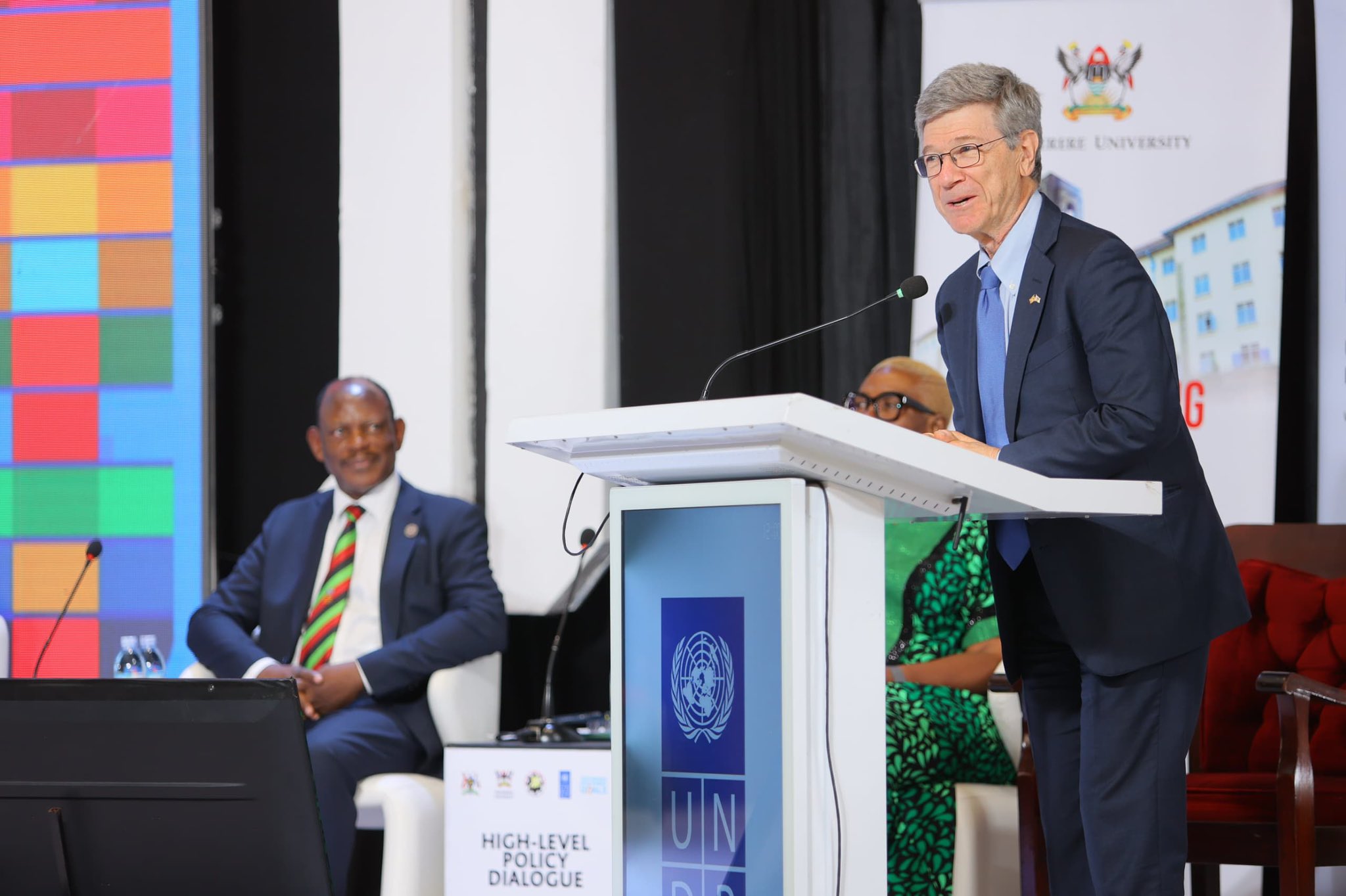
The Government of Uganda has been called upon to put in place measures to ensure the effective implementation of the Parish Development Model (PDM) programme. The call was made at a High-Level Policy Dialogue organized by the United Nations Development Programme (UNDP), in partnership with the Office of the Prime Minister (OPM), National Planning Authority and Makerere University.
Hosted by Makerere University on Wednesday 28th February 2024 at the Yusuf Lule Central Teaching Facility Auditorium, the Dialogue was based on the theme “Accelerating the Sustainable Development Goals through leveraging Innovating Financing, the Parish Development Model, and Science and Technology”. During the dialogue, the government was urged to set up institutions that can track the usage of the program funds to ensure that the over Shs1 Trillion pumped into the program annually does not go to waste.
This call was made by Prof Ezra Suruma, the Chancellor Emeritus of Makerere University and Uganda’s former Minister of Finance, who was a panelist at the dialogue. Hon Suruma warned that currently, it is difficult to assess the achievements of PDM since there is no clear monitoring of the projects at the parish level where the money is being invested.
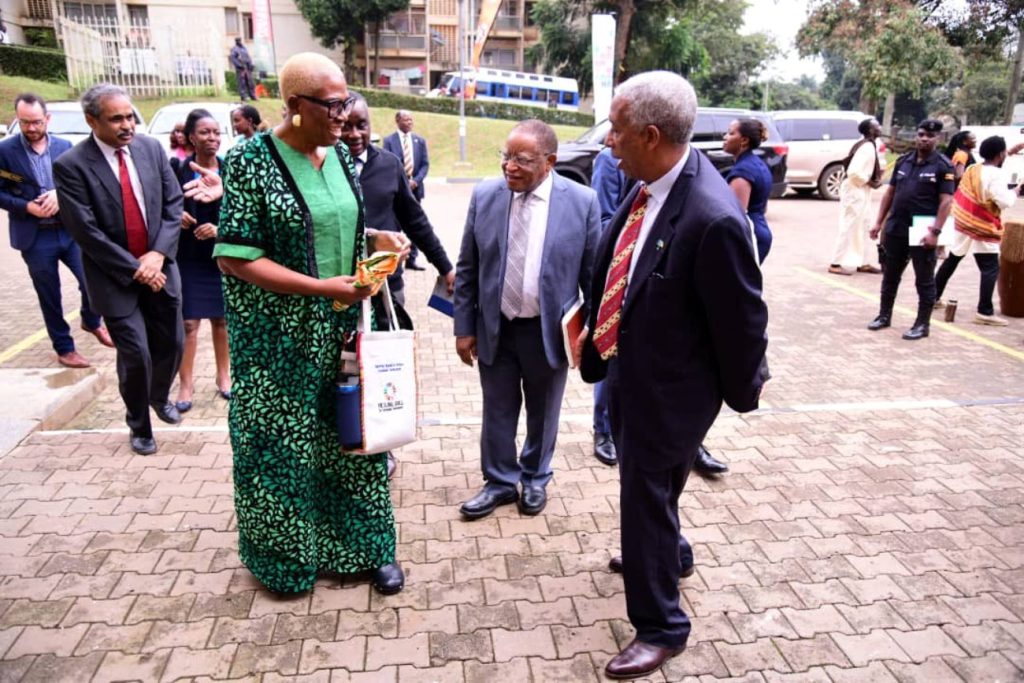
“In Uganda, we are investing Shs 1 Trillion in the 10,594 parishes, but if you ask where it is going, you can’t find it. The PDM money is capital that the government is attempting to invest in our country and that capital is supposed to accumulate over time. If we invest Shs1 Trillion this year, next year we should have more than that,” Prof. Suruma said.
The Chancellor Emeritus as such, called for the establishment of an institution that can trace where the PDM funds are being invested so that this money is treated as an investment and not consumption.
Minister for Local Government Hon Raphael Magyezi however, assured Prof Suruma and the audience that implementation of the PDM program is highly monitored and leakages are extremely minimal. This, he said, was because the government decided to digitalize payments of the PDM money directly from the Treasury to the parish-based SACCOs. Furthermore, he noted that Government has put in place the PDM Management Information System (MIS) in line with the Sustainable Development Goals (SDGs) emphasis on data for development.
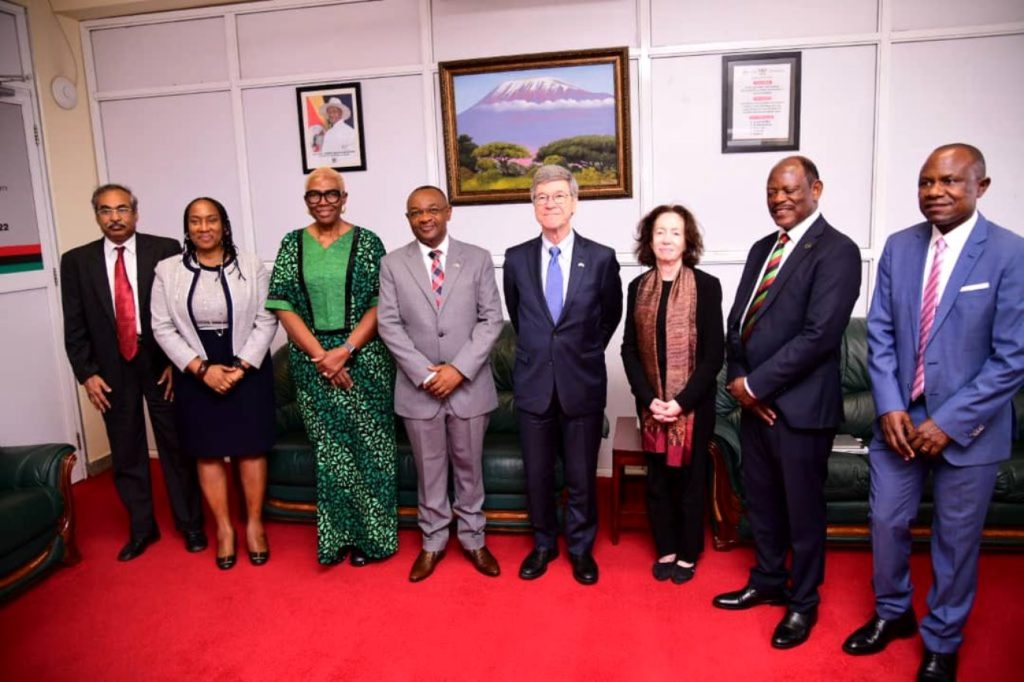
“We have developed our own Management Information System so that we know which household is actually in subsistence, and we have parameters for that, and we are able to monitor and evaluate our programme based on a tracker system” Hon. Magyezi explained.
The Minister further noted that PDM targets 8.9 million households in Uganda, 39% (3.4 million) of which are still engaged in subsistence, with 1 million of these reached so far. He admitted although the PDM still has its work cut out, the Government is proud of the progress so far. Hon. Magyezi shared that Uganda has 145 establishments at the level of Local Council 5 consisting of 135 Districts and 10 Cities, 2,284 Sub-Counties to supervise the parishes and under the parishes, 70,626 villages.
The Prime Minister, Rt. Hon. Robinah Nabbanja who was Chief Guest at the lecture shared that PDM is the Government of Uganda’s second key strategy for accelerating the SDGs and commended the Model as a “comprehensive strategy to uplift the incomes and welfare of all Ugandans.” The first key strategy is Leveraging Innovative Financing Mechanisms, while the third is putting more focus on Science, Technology and Innovation.
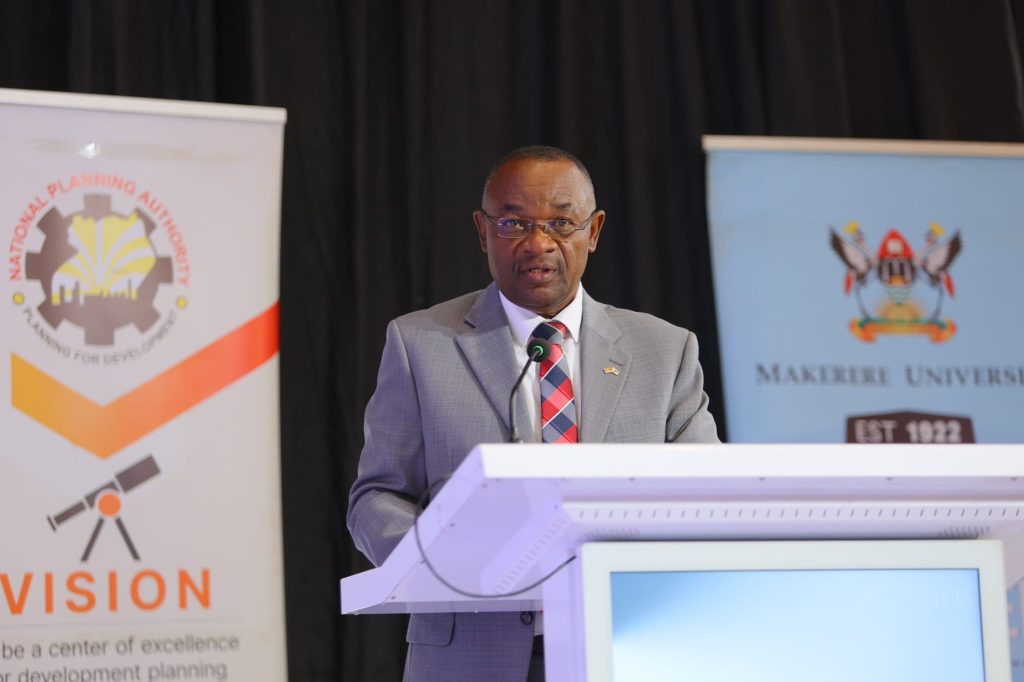
Rt. Hon. Nabbanja highlighted the government’s commitment to harnessing the power of research and innovation to provide a strong foundation to advance the digital agenda. She added that the PDM Laboratory at Makerere gives the University an opportunity to amplify and support efficiency and effectiveness of the programme’s implementation.
“Therefore, the PDM Laboratory should continue to be a platform for 1) Distilling and providing additional insights, 2) Commissioning further research and enquiry on the basis of information provided by the technical units and feedback and 3) Analyse feedback to test out policies and operational issues for Cabinet to take action” remarked the Prime Minister.
She informed the audience that Prof. Jeffrey Sachs is leading similar efforts with a lab at Columbia University and urged the leadership of Makerere University to establish a collaboration with Columbia University, “and I’m sure Prof. Sachs is much willing to support this”.
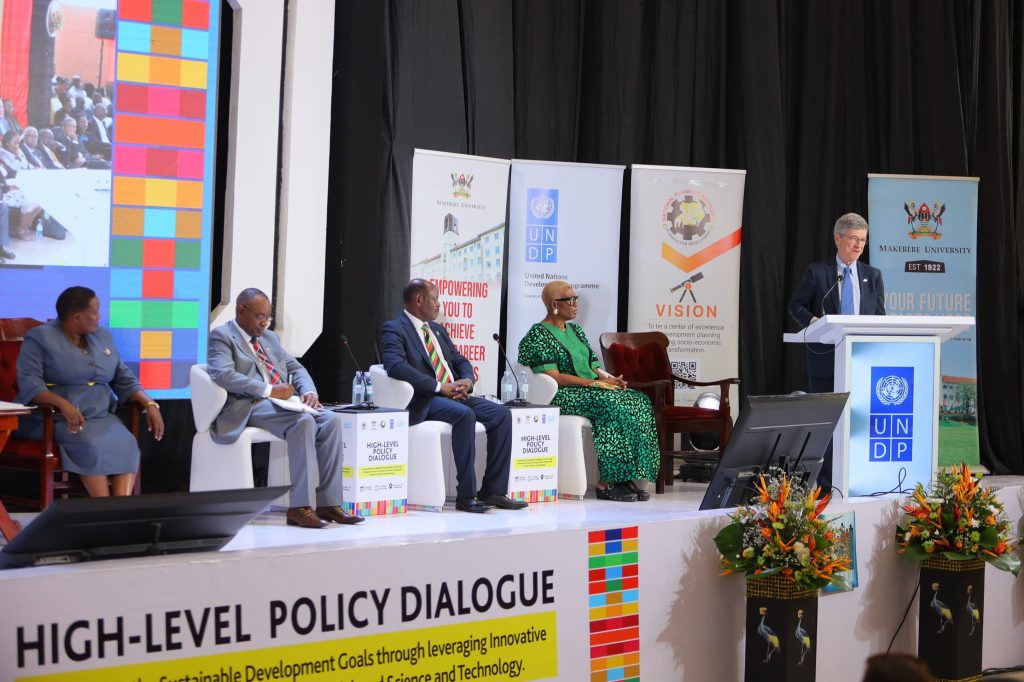
Professor Jeffrey Sachs, a world-renowned Economist, leader in sustainable development, and senior UN advisor delivered a keynote address in which he expressed optimism about development prospects on the African continent.
The prolific economist and author, projected that Africa would take off and become a global economic force in the next 40 years if it could find ways of uniting into a single economic block.
Citing China and India Prof. Sachs advised the government to set targets and also set instruments to help achieve these targets, if the country is to achieve the SDGs. The simple idea of “targets and instruments” was developed by Nobel Prize Laureate Jan Tinbergen. Tinbergen was awarded the first Nobel Prize in Economics in 1969 together with Ragnar Frisch.
Prof. Sachs defined Sustainable Development as the result of achieving four difficult objectives namely; Material wellbeing for everybody, Social inclusion, Environmental Sustainability, and Peace and Cooperation. He nevertheless shared that these can be achieved by Tinbergen’s “targets and instruments” idea.
He advised Uganda to copy China and invest in six major types of capital namely; Education, Infrastructure, Massive Interconnected Infrastructure, Protecting Natural Capital such as clean energy sources, Intellectual/Science and Technology Capital as well as Business Capital. On financing, he advised the government to find flexible and low interest financing with 40 year maturity if it is for sectors such as education.
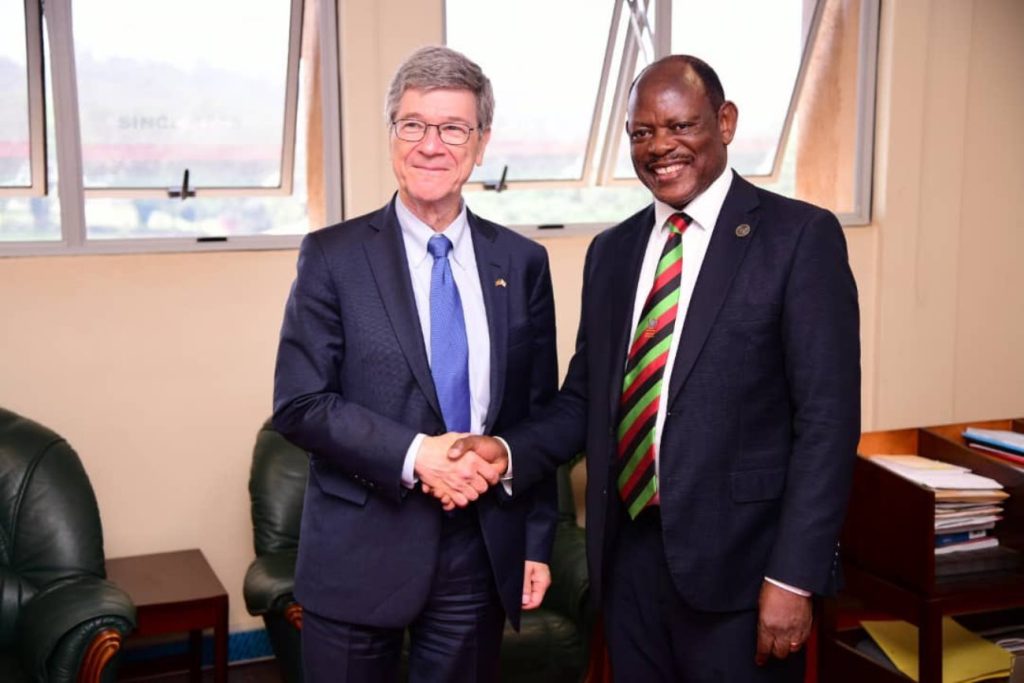
“What I want to promise you, though I can’t give you the final answer for that part of innovative financing, we are going to get it done. Uganda is going to show a strong NDP IV, it is going to show a very robust plan to achieve rapid growth over the next 40 years, it is going to show that that rapid growth easily repays any long-term low-interest loans that have taken to achieve that, it is going to make the case that the Parish Development Model proves the last mile in an ingenious way, and that institutionally this country is poised for the breakthrough that we are talking about at the regional, national and local level” Prof. Sachs summed up.
In her remarks, Ms. Nwanneakolam Vwede-Obahor, the UNDP Resident Representative warned of Uganda’s widening development financing gap, standing currently at 33 trillion shillings (US$ 8.8 billion) annually.
“Traditional financing sources such as domestic taxes, Overseas Development Assistance (ODA), concessional loans from external partners, borrowing from the domestic market and foreign direct investment are not enough to finance the SDGs,” she said.
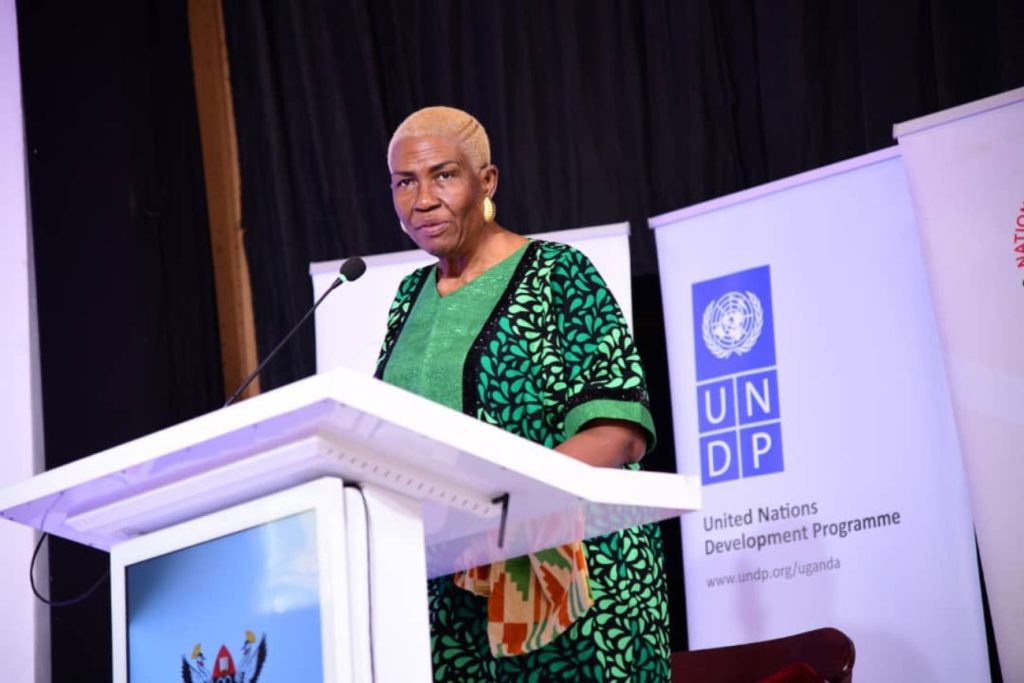
“Uganda must explore alternative avenues to secure affordable and flexible financing to drive the development phase in the next seven years. This will involve continuous alignment of the budget allocations and development plans with SDG priorities, diversifying funding sources, including public-private partnerships and unlocking new innovative financing models, and enhancing financial resilience.”
The dignitaries, accompanied by the Vice Chancellor, Prof. Barnabas Nawangwe, toured the state-of-the-art Innovation Pod, which is poised to drive innovation and research in the country. In his remarks, the Vice Chancellor said that Makerere remains focused on implementing strategies and programmes under SDG 4 which emphasizes Quality Education. “I am therefore pleased that today, as we continue the implementation of Sustainable Development Goals, Makerere University is on board hosting Prof. Jeffrey Sachs, the Office of the Prime Minister, National Planning Authority, UNDP, and a number of stakeholders to enhance the discussion on leveraging innovative financing, the parish development model and science and technology.”
Prof. Nawangwe shared with the audience, Makerere’s readiness to contribute to the success of the PDM, citing the role of the PDM Policy lab headed by Prof. Eria Hisali. The PDM Policy lab conducted capacity building to sensitise low-income earners about government programs and how they can utilize the funds to improve their standards of living. The lab continues to undertake research on how to effectively implement PDM. The Vice Chancellor equally shared Makerere University’s commitment to undertaking research and programmes aimed at ensuring that health becomes a priority on the global agenda through the Centre of Excellence for Sustainable Health (CESH). Established in partnership with the Karolinska Institute, Sweden, CESH’s core activities include; Capacity development and Education, Tools and resources, Networks and partnerships, and Research.
You may like
-


Simplicity, Service & Scholarship: Hallmarks of Professor Livingstone Luboobi’s Legacy
-


EfD-Mak Holds 2nd Advisory Board Meeting: Charts Path for Growth
-


Public University Legal and Accounting Officers Trained on Governance and Compliance
-


Celebrating the Life of Prof. Livingstone Sserwadda Luboobi
-


Fare Thee Well Prof. Luboobi
-


Strengthening Grants Management Through Institutional Collaboration and Capacity Building
General
Simplicity, Service & Scholarship: Hallmarks of Professor Livingstone Luboobi’s Legacy
Published
9 hours agoon
July 18, 2025By
Eve Nakyanzi
On Wednesday 16th July 2025, Makerere University lost one of its most cherished sons, Professor Livingstone Sserwadda Luboobi. Described as a mathematician, academic leader, and humble servant, Professor Luboobi devoted more than five decades to the university, rising through the ranks to become Vice Chancellor, and leaving a legacy defined by simplicity, service, and scholarship.
Born to Lameka Serwadda and Sanyu Serwadda on 25th December 1944 in Mitondo, Kalisizo, Kyotera District, Professor Luboobi’s academic career begun as a third-year student at Makerere and continued with unwavering loyalty until his passing. His life’s work reflected not only a commitment to mathematics but also nurturing generations of scholars and leaders across Uganda and beyond.
A funeral service was held in his honour at St. Francis Chapel, Makerere University on 18th July 2025. It was a moment of solemn remembrance and heartfelt tribute. Rev. Canon Dr. John Senyonyi delivered the sermon titled “Only God Knows,” reminding mourners of the mystery and grace of life’s journey. Rev. Canon Geoffrey Byarugaba represented the Kampala Diocese at the service, while former St. Francis Chaplain, Rev. Dr. Canon Johnson Ebong thanked Professor Luboobi for spearheading the Chapel’s expansion. Friends, colleagues, and family members filled the chapel, joined in mourning but also in gratitude for a life that had deeply touched theirs.

Mrs. Lorna Magara, Chairperson of the University Council, spoke movingly about Professor Luboobi’s faithfulness, likening his life to the biblical call in Mark 10:43, “Whoever wants to become great among you must be your servant.”
In his condolence message, the Vice Chancellor, Professor Barnabas Nawangwe, hailed Professor Luboobi as a visionary leader whose legacy is deeply woven into Makerere’s identity as a research-led institution. He credited Professor Luboobi with laying the groundwork for a culture of inquiry—championing graduate programmes, encouraging doctoral training, and fostering international collaborations that strengthened the university’s research profile. “He believed in building systems, not just structures,” noting that many of Makerere’s current research policies stem from his leadership. Even in retirement, Professor Luboobi remained a source of wisdom and guidance, quietly shaping the future of the university he so deeply loved.
Speaker after speaker painted a portrait of a man who led not by pomp, but by quiet strength and deep conviction. The Principal, Professor Winston Tumps Ireeta, speaking on behalf of the College of Natural Sciences (CoNAS), described Professor Luboobi as a foundational figure whose influence is deeply etched in the structures and spirit of the college. He spoke with emotion about Luboobi’s unwavering commitment to academic integrity and his belief in the power of mentorship.

“He was not just a mathematician,” Professor Ireeta said, “he was a visionary who understood the soul of the university. Even in retirement, he remained an advisor, a guide, and a quiet force of wisdom.” He concluded by saying that the college would continue to draw from his example as it navigates the future of science and innovation in Uganda.
Professor Luboobi’s illustrious career at Makerere University included serving as Head, Department of Mathematics from 1990 to 1991. The current Head of Department, Dr. Ismail Mirumbe remembered him as a pillar in the teaching and development of mathematics in Uganda
Professor John Mango, who served as Head, Department of Mathematics during Professor Luboobi’s term as Vice Chancellor from 2004 to 2009 described him as a towering figure of integrity and principle, someone who not only upheld the highest standards of academic conduct but insisted that others around him do the same. “He was a pillar in the department,” Prof. Mango remarked, “and his moral compass was unwavering.”

He recalled instances where Professor Luboobi made firm decisions, including terminating contracts when integrity was compromised, setting a tone that shaped the department’s reputation for honesty and excellence. Even as Vice Chancellor, he remained deeply involved in the department’s affairs, teaching, supervising students, all the while handling top administrative duties punctually. Prof. Mango spoke with great admiration of a man who led by example, mentored many, and whose contributions to mathematics education, research, and policy-making continue to shape the future of the discipline in Uganda and beyond.
According to an article from 1990 written by Dr. Vincent Ssembatya and Andrew Vince at the University of Florida, the Uganda Mathematical Society (UMS), which was formally established on 25th November, 1972 has since inception enjoyed major support from Makerere University and Kyambogo University in terms of infrastructure and leadership. Professor Paul Mugambi, who was also present at Professor Luboobi’s funeral service was elected first president of the UMS. Dr. Saul Nsubuga from the Department of Mathematics represented UMS at the service, honouring Professor Luboobi’s pioneering role in the discipline.
The service also featured tributes from close friends and family. Loved ones shared stories of a man who remained grounded no matter how high he rose, a man who valued relationships and walked closely with his faith. His children and grandchildren remembered him as a father who was ever-present, a listener, and a source of steady guidance.

Professor Daniel Kibuule, son of the late Professor Luboobi and Dean, Faculty of Health Sciences at Busitema University, delivered a deeply personal tribute that painted a full portrait of his father’s life, values, and final days. He expressed gratitude to the University leadership, family, friends, and medical professionals who stood with them during a challenging period. He particularly thanked his siblings, Dr. David Kimera and Dr. Irene Nakiyimba for their unwavering role in caring for Professor Luboobi through illness.
He spoke of a man who, despite great academic accolades, remained deeply humble and committed to discipline, simplicity, and faith. From instilling punctuality and responsibility to ensuring his children charted their own paths, none bearing his surname “Luboobi”, Prof. Luboobi was intentional in every lesson he passed on. Kibuule recalled his father’s insistence on being at home even in his final moments, his strong connection to Christ, and his quiet strength despite his failing health.
Former students and mentees echoed the same sentiments, of a teacher who was generous with his time and invested deeply in others’ growth. The community that gathered was not only there to grieve but to celebrate the quiet legacy of a man whose example continues to live on.
Among the mourners were public figures and leaders, including Hon. Abed Bwanika, Member of Parliament for Kimanya-Kabonera, Hon. Nyombi Thembo, the Executive Director Uganda Communications Commission, and Hon. Dr. Ham-Mukasa Mulira, former Minister of ICT, among others.
In his passing, Makerere University has lost a pillar, but his life reminds us that greatness lies in consistency, in humility, and in service to others. Professor Luboobi’s memory will continue to live on in the minds he shaped, the systems he built, and the values he embodied. He ran his race with grace.
The Writer is a Volunteer in the Public Relations Office, Makerere University
Please click the embedded video below to view the service livestream
General
Public University Legal and Accounting Officers Trained on Governance and Compliance
Published
2 days agoon
July 17, 2025By
Eve Nakyanzi
Legal and accounting officers from public universities across Uganda have convened, for a high-level training workshop organized by Makerere University. The three-day training, taking place from July 16th to 18th, 2025, is aimed at strengthening legal frameworks, improving institutional governance, and ensuring compliance with public finance and procurement laws within higher education institutions.
Ms. Lorna Magara, Chairperson of the Makerere University Council and Guest of Honour at the opening session, commended the initiative as timely and necessary. She addressed the growing backlog of court cases affecting Makerere and other public universities and outlined measures already taken to mitigate legal risks. These include the establishment of a Legal Rules and Privileges Committee and the Directorate of Legal Affairs, part of a broader strategy to improve legal compliance and foster good governance.
Representing the Vice Chancellor, Prof. Winston Tumps – Ag. Deputy Vice Chancellor (Finance and Administration), described the training as both strategic and practical. “It is imperative that we learn from each other, especially in how we handle employee litigation and institutional legal risks,” he remarked. He added that the program is designed to promote experience-sharing across universities and enhance collective institutional growth.

In his address, Mr. Yusuf Kiranda, University Secretary at Makerere University, emphasized the urgent need for robust legal oversight and more effective case management mechanisms within public universities.
The training featured a keynote address by the Attorney General of Uganda, Hon. Kiryowa Kiwanuka, who provided critical insights into legal expectations for public institutions. He warned that failure to heed legal advice could result in personal liability for accounting officers, citing a precedent involving the Uganda Cancer Institute. “Universities must consult the Attorney General’s chambers before entering into major contractual obligations,” he advised, urging legal officers to document decisions meticulously as proper record-keeping forms the first line of defense in legal disputes.

Hon. Kiwanuka further discussed the government’s ongoing efforts to recentralize legal services to ensure alignment with the Attorney General’s office. He cautioned in-house counsel against becoming overly entangled in decision-making processes, stressing the need for objectivity. Other key issues he addressed included contract approvals, misuse of Memoranda of Understanding (MoUs), and lapses in procurement processes, particularly at the close of financial years.
Participants also benefited from insights by Hon. Justice Musa Ssekaana of the Court of Appeal, who offered an in-depth analysis of judicial review and its significance in promoting lawful, transparent university governance. He called on university legal officers to act with clarity, timeliness, and accountability.
Lady Justice Joyce Kavuma, Judge of the High Court, delivered a comprehensive presentation on dispute and claim management involving public universities. She addressed emerging trends in civil litigation, emphasizing the importance of due process, transparency, and clear communication in resolving employment, student, and contractual disputes. Drawing on real case examples, she urged institutions to strengthen internal systems, embrace participatory governance, and adopt regional best practices to minimize litigation and protect institutional reputation.

The training reflects a shared commitment among public universities to build a more accountable, legally sound, and strategically aligned higher education system in Uganda. Through peer learning and collaboration, participating institutions aim to reduce litigation, enhance institutional autonomy, and uphold the rule of law.
Participating universities include Makerere University, Kyambogo University, Mbarara University of Science and Technology, Busitema University, Mountains of the Moon University, and Lira University.
The training concludes on July 18th 2025, with sessions focusing on employment dispute management in public universities and the implications of recent PPDA Appeals Tribunal decisions on procurement and disposal practices within public entities.
General
Celebrating the Life of Prof. Livingstone Sserwadda Luboobi
Published
2 days agoon
July 17, 2025By
Mak Editor
A Visionary Leader, Seasoned Mathematician, & Humble Academician
It is with profound love and respect that we celebrate the life of Prof. Livingstone Sserwadda Luboobi, a distinguished scholar, transformative leader, and beloved Vice Chancellor Emeritus of Makerere University. His legacy is woven in the fabric of African higher education, marked by intellectual brilliance, unwavering commitment to academic excellence, and a life of selfless service.
A Life of Purpose and Vision
Prof. Luboobi was more than a mathematician. He was a visionary, whose work transcended equations and research papers. Serving as Vice Chancellor from 2004 to 2009, he led Makerere University through a critical period of growth and transformation. Under his guidance, the university expanded its reach, strengthened its academic rigor, and embraced innovation and reform. His calm demeanour and principled decision-making earned the admiration of students, faculty, and peers alike.
Prof. Luboobi was deeply committed to nurturing talent and fostering intellectual curiosity, leaving an indelible mark on the institution’s culture and future direction.
Beyond Uganda, Prof. Luboobi’s influence resonated across the global academic community. He was a passionate advocate for the transformative power of science and education, often speaking at international forums and collaborating on research that bridged continents and disciplines. His work helped elevate the profile of African scholarship on the world stage.
His legacy endures not only in the impressive body of work he left behind but also in the countless lives he touched – students, educators, and leaders who continue to draw inspiration from him.
Academic and Leadership Journey at Makerere University
An illustrious alumnus of Makerere University, Prof. Luboobi graduated with First Class Honours in Mathematics, laying the foundation for an extraordinary academic journey. He pursued further studies at the University of Toronto (MSc in Operations Research, 1971-72) and the University of Adelaide (PhD in Biomathematics, 1978–80). His scholarly journey spanned prestigious institutions worldwide, including UCLA, the University of Bergen, and the University of Dar es Salaam, establishing him as a scholar of global repute and a proud ambassador of African intellectualism.
Prof. Luboobi’s service to Makerere begun in 1970 as a Special Assistant-remarkably, while still an undergraduate, rising through the ranks to full Professor in 1997. He served as Head of Department, Dean of the Faculty of Science (1994–2001), and later became the university’s first elected Vice Chancellor. His tenure brought new energy to institutional leadership, characterized by transparency, inclusivity, strategic direction and accountability.
Strategic Reforms and Institutional Impact
A true architect of transformation, Prof. Luboobi chaired the development of Makerere’s first locally-conceived Strategic Plan (1990–91). He was instrumental in securing a UGX30 billion grant from NORAD in 1999, which revitalized key academic areas such as computing, gender studies, and food science. He co-founded the Makerere University Private Sector Forum, bridging the gap between academia and industry, and strengthening alumni engagement and resource mobilization.
Pioneering Biomathematics and Mentorship
As one of Africa’s pioneering biomathematicians, Prof. Luboobi introduced mathematical modeling to tackle real-world problems in epidemiology, ecology, and operations research. His scholarly contributions – over 150 publications – reflect the depth and breadth of his research. Yet, perhaps his most lasting impact lies in mentorship: he supervised more than 35 PhD and over 50 MSc students, including Makerere’s first female PhD graduate in Mathematics, nurturing a generation of scholars and leaders.
Prof. Luboobi’s Contribution to the Internationalization of Makerere University
Prof. Luboobi played a pivotal role in advancing the international profile of Makerere University. Demonstrating remarkable personal commitment, he utilized his own resources to support the establishment of the University’s International Office. This strategic initiative laid the foundation for a more structured and effective engagement with global academic institutions, development partners, and international students. As a result, Makerere University significantly enhanced its global footprint, forming numerous international collaborations and attracting increased academic and research opportunities from abroad.
In addition to his contributions to internationalization, Prof. Luboobi was also instrumental in revitalizing the University’s Public Relations Unit. Under his guidance, the unit adopted more proactive and professional communication strategies, which greatly improved the institution’s public image. This, in turn, fostered greater public trust and strengthened the university’s reputation both locally and internationally. His visionary leadership in these areas has had a lasting impact, positioning Makerere University as a leading institution in East Africa and beyond.
Global Recognition and Enduring Legacy
Prof. Luboobi’s contributions earned him widespread recognition. In 2008, the University of Bergen awarded him an Honorary Doctorate for his role in internationalizing academia. Makerere University honoured him with a Lifetime Achievement Award in 2013, and the Government of Uganda conferred upon him a National Gold Medal for his unwavering service to education and national development.
Even after retirement, Prof. Luboobi remained an active contributor to academic life-lecturing, supervising, and advising the university.
A Lasting Light in African Academia
Prof. Livingstone Sserwadda Luboobi’s life was a model of scholarship anchored in service, leadership tempered with humility, and an unshakable belief in the power of education. He leaves behind a vibrant academic legacy and a trail of inspired minds. His contributions will continue to shape Makerere University, Uganda, and the global academic community for generations to come.
We extend our heartfelt condolences to his family, colleagues, and the entire Makerere University community during this difficult time.
May his soul rest in eternal peace.
Trending
-

 General2 weeks ago
General2 weeks agoRe-advert: Admission to Undergraduate Programmes 2025/2026
-

 General1 week ago
General1 week agoRe-Advert for Applications for Diploma and Certificate Training
-

 General5 days ago
General5 days agoMakerere University Fees Waiver for 40 First Year Female Students 2025/2026
-

 General2 weeks ago
General2 weeks agoPress Statement on Ranking
-

 Health1 week ago
Health1 week agoCall for Applications: Responsible Conduct of Research (RCR) Training Course
